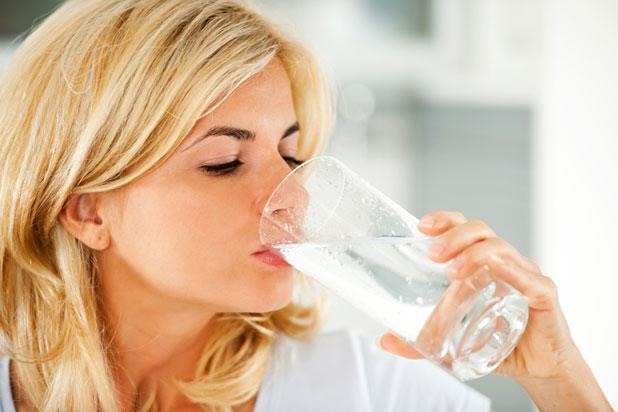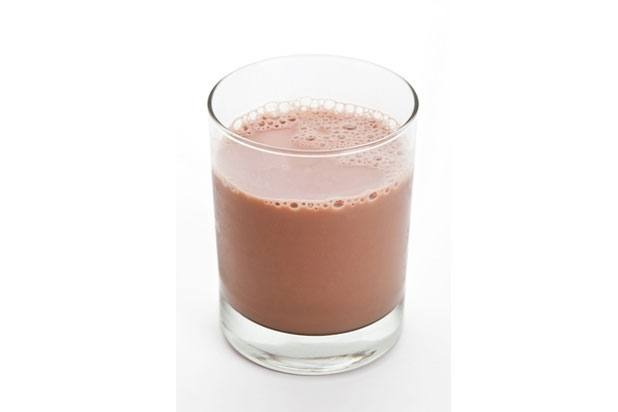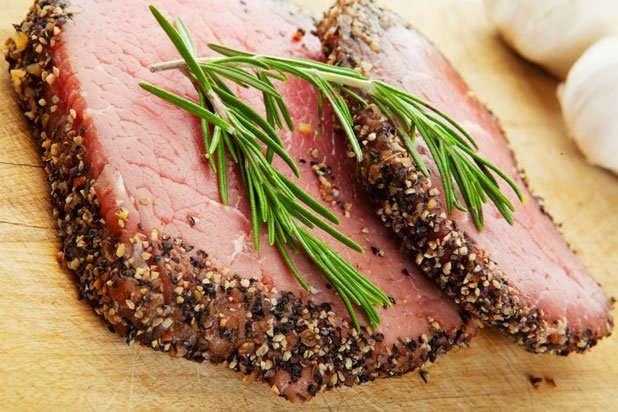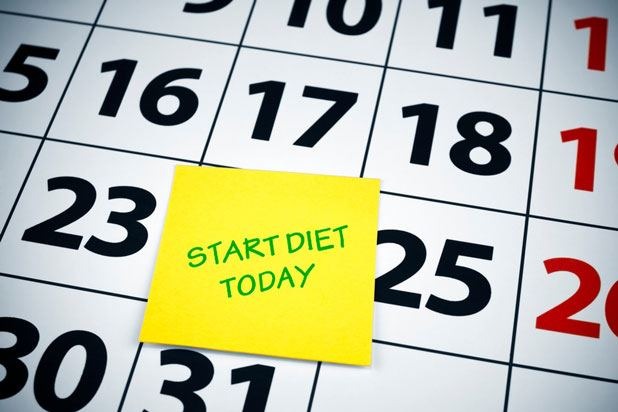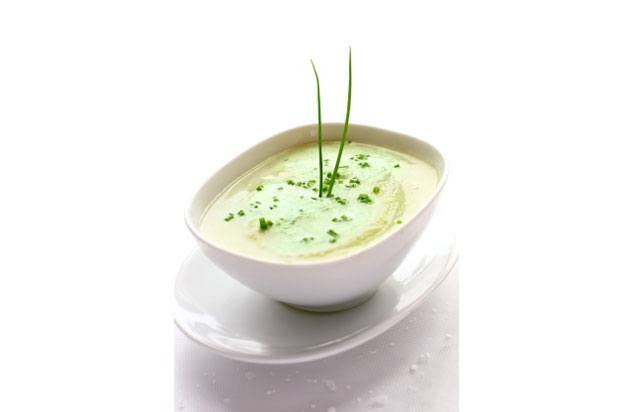10 Diets That Don't Work
The Basics: Throughout each day, you need to drink 64 ounces of pure water that is kept at 50 degrees Fahrenheit or colder. The idea is that the body needs to use energy to heat the water to body temperature, and doing so will burn about 12 calories for every pint of water. Thus, one who is on the water diet will burn calories naturally by using internal energy to heat the water, while completely flushing out their system.
Why It Won't Work: "Theoretically, the science behind it makes sense on a molecular level, but it doesn't make sense on a clinical level," explains Bock. "You're not going to see it work effectively in a person." While Bock does concede that drinking more water each day does promote a healthier lifestyle, it is the "cold" water factor that makes people believe they are doing something effective toward weight loss. More importantly, not everyone could follow a diet like this, such as heart, kidney, and liver patients who have fluid retention problems and electrolyte imbalances.
2. The Chocolate Milk Diet
The Basics: The crux of this diet states that drinking three glasses of 1-percent chocolate milk throughout the day, alongside a healthy diet, will increase weight loss. Because of the calcium, vitamin D, endurance-boosting capabilities for workouts, and positive protein-body weight connection, chocolate milk has the power to help you diet "without ever dieting again." Each component offers lofty reasons, mostly combinations of protein and carbohydrates, as to why it will aid your metabolism to help you burn fat.
Why It Won't Work: "Cheese and crackers are protein and carbohydrates," Bock candidly remarks. "The fact that it's chocolate milk makes it more appealing. They are saying the calcium serves as a metabolic booster and the vitamin D will help you burn fat — these are all anecdotal. There is no proof that vitamin D substitution or calcium causes weight loss. In the big clinical picture, it does not produce the outcome." Protein and carbohydrates that are found in this diet are actually used to replenish the body 30 minutes after a workout. While Bock gives the diet credit for promoting an exercise routine, he insists that any weight loss using this method hardly has anything to do with the chocolate milk itself.
3. Low-Carb Diets
The Basics: You basically start eating a lot less carbohydrates, including fruits and starchy vegetables, and replace them with high-protein foods. Your body breaks down carbohydrates to use as its main fuel source by producing glucose, which enters your body's cells with the help of insulin. The theory is that insulin prevents fat breakdown in the body by allowing sugar to be used for energy. Decreasing carbs results in lower insulin levels, burning stored fat for energy, and ultimately helping to shed excess weight.
Why It Won't Work: When the Atkins diet first arrived on the scene, some participants rationalized that a pound of bacon was better for you than bread, while others only ate 150 calories of carbs a day. "There are too many misconceptions and variables when it comes to this diet," says Bock. "The American Dietetic Association recommends getting 55 to 60 percent of your calories from carbohydrates." For most people, Bock admits that can be excessive. Carbohydrate intake needs to be tailored to fit a patient's needs — especially because it is recommended that pregnant women, teens, and those with diabetes beware of this diet. While watching carbohydrate levels is important because it is a main source of energy for the body, it really should be measured by a professional in the nutrition field to ensure real, healthy weight loss.
4. Paleo Diet
The Basics: This plan is based on a presumed ancient diet of wild plants and animals followed by those from the Paleolithic era. It is based on the principle that hunter-gatherer societies did not suffer from "diseases of civilization," due to a lack of calories in their diet, as well as additives or worse.
Why It Won't Work: "I do like this diet in a way because it promotes whole foods," Bock admits. "Scientifically, you are going to be very restricted in [that] you are going to miss dairy, whole grains, and beans, which are an important source of nutrients."
5. Chewing Diet
The Basics: This diet entails chewing your food thoroughly — as in chewing each bite 80 times — to basically liquefy your food. Then, you spit it out. On paper, you will absorb fewer calories while still enjoying the taste of food.
Why It Won't Work: "This is just short of bulimia," states Bock. "This is a psychological problem and a form of disordered eating habits." With such high levels of mastication, it almost causes an aversion to food — you'll get tired of chewing so much. Socially, it isn't acceptable, either. Ultimately, you are creating a nutrient imbalance, because you aren't getting the micronutrients or food absorption you need. Your body is also overproducing stomach acid in anticipation of digestion it will never need to do, leading to reflux and damaged teeth from housing food in the mouth for so long.
6. Baby Food Diet
The Basics: The idea is simple: Replace one or two meals a day with 14 various jars of baby food and stick to one regular meal a day or several high-calorie snacks. While the quality of the baby food you choose does matter, the theory states that the portion-controlled jars will prevent overeating and you will become satisfied with smaller portions of food.
Why It Won't Work: "All in all, baby food is not fortified for an adult. You're missing key nutrients," Bock explains. "Eventually, it could lead to bone density issues. While it isn't necessarily harmful, it just isn't doable long-term." While the weight may come off, it isn't going to stay off unless you eat baby food for the rest of your life, which could spell trouble.
7. 17-Day Diet
The Basics: This diet is not just 17 days long, but rather three 17-day cycles of regulating your carbohydrate intake to keep your metabolism guessing. The idea is that shifting your meal plan every 17 days, before your body registers certain eating habits, you can keep your metabolism in high gear. You start out overly restrictive and under-caloric in the beginning, then move on to eating 1,500 calories a day, and then the third phase has you overindulging on the weekends.
Why It Won't Work: "First off, there is no proof that it speeds up your metabolism — and to fool your metabolism is impossible, as well," Bock states. The idea that you can trick your body and treat it on the weekends is silly, too. "Why not have a little bit of the food you like every day in moderate portions? Indulging on the weekends is pointless — your body doesn't know that it is Tuesday or Saturday night."
8. Cabbage Soup Diet
The Basics: For a solid week, "indulge" in a bottomless bowl of cabbage soup and some select low-calorie food options. It promises to help you shed 10 pounds in that week, however there are no set guidelines to help you manage your weight loss.
Why It Won't Work: "People lose a lot of weight from this diet because of the diarrhea they get from it alone," says Bock. "You aren't getting any calories, [and] you're getting bloated and full from a very restrictive diet. From a gastrointestinal standpoint, it is catastrophic on the variability from day to day."
9. HCG Diet
The Basics: This diet is an intense, 40-day, 500-calorie diet consisting of vegetables, fruits, and two meals of 3.5 ounces of protein alongside injections of HCG, a hormone found in pregnant women. The theory is that it will create some symptoms of pregnancy, such as nausea from morning sickness, to help control your desire to eat. While injections aren't the only way HCG is distributed (there are tablets, etc.), it is believed that the injection method is the only one that is of any benefit.
Why It Won't Work: "This is a completely unsafe method of losing weight. A 500-calorie diet is considered unsafe because it is so hypo-caloric that it could never meet your needs," explains Bock. Plus, he goes on to say that there is no proof that the hormone itself will help you lose weight.
10. The Hallelujah Diet
The Basics: An all-vegetable diet made of of 85 percent raw, uncooked foods and 15 percent cooked foods. Vegetables that are uncooked are in a more natural state, according to this diet, and cooked vegetables are tainted by whatever juices they may be cooked in.
Why It Won't Work: "I'm not a fan of vegan diets in general," Bock claims. "They aren't very safe. Most patients really need to be monitored very closely by health professionals because they often become anemic." Also, eating solely raw vegetables is not only hard on your digestive system, since cooked foods are absorbed more easily, but there is no proof that raw vegetables are more effective than cooked ones.
